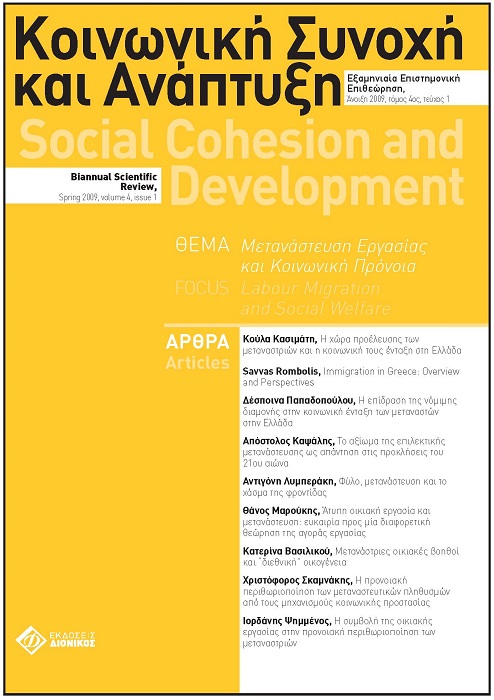Immigration in Greece: overview and perspectives
Abstract
The present paper examines immigration
in Greece over the past two decades.
Economic immigrants in Greece, despite
the absence of reliable offi cial data, exceed
one million, while immigration has lead
to the development of policies relating
to the planning and implementation of
a coherent immigration policy centered
on the legalization and the integration
of immigrants in the Greek society. This
necessity stems from the twenty year old
existence of immigration in Greece as well
as from a series of developments affecting
core public policies such as education,
employment, income, social insurance,
health care, residence, legalization and
integration of immigrants.
Nonetheless, it should be pointed out,
that the size and the complexity of the
phenomenon requires the development
of a coherent policy that will in turn
enhance effectiveness in tackling the
social, economic, and political aspects
of immigration. In addition, the role of
immigrants in society, the labor market
and the economy constitutes a further
point towards that direction.
Article Details
- Zitationsvorschlag
-
Robolis, S. (2016). Immigration in Greece: overview and perspectives. Social Cohesion and Development, 4(1), 27–44. https://doi.org/10.12681/scad.8904
- Rubrik
- Articles

Dieses Werk steht unter der Lizenz Creative Commons Namensnennung - Nicht-kommerziell - Weitergabe unter gleichen Bedingungen 4.0 International.
Authors who publish with this journal agree to the following terms:
- Authors retain copyright and grant the journal right of first publication with the work simultaneously licensed under a Creative Commons Attribution Non-Commercial License that allows others to share the work with an acknowledgement of the work's authorship and initial publication in this journal.
- Authors are able to enter into separate, additional contractual arrangements for the non-exclusive distribution of the journal's published version of the work (e.g. post it to an institutional repository or publish it in a book), with an acknowledgement of its initial publication in this journal.
- Authors are permitted and encouraged to post their work online (preferably in institutional repositories or on their website) prior to and during the submission process, as it can lead to productive exchanges, as well as earlier and greater citation of published work (See The Effect of Open Access).



